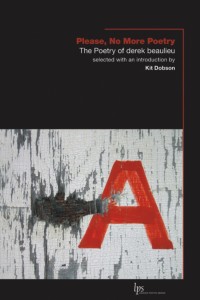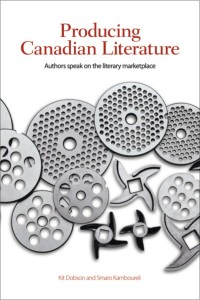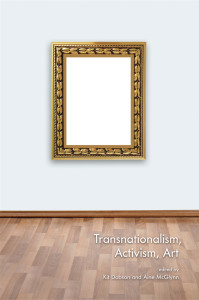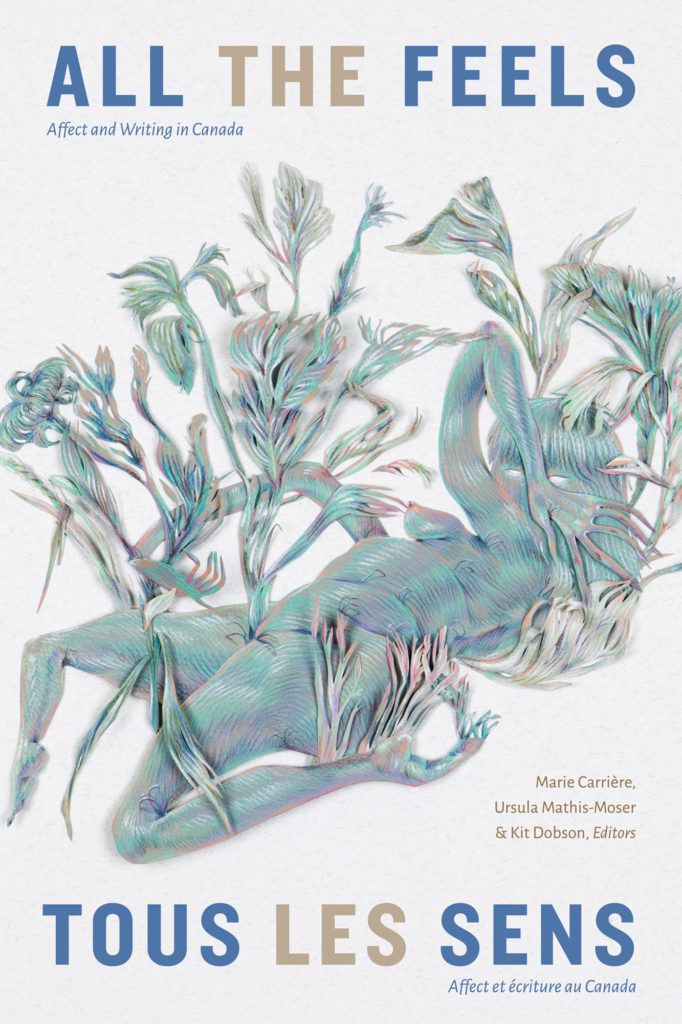
All the Feels / Tous les sens: Affect and Writing in Canada / Affect et écriture au Canada (Edmonton: University of Alberta Press, 2021)
From the publisher’s website:
All the Feels / Tous les sens presents research into emotion and cognition in Canadian, Indigenous, and Québécois writings in English or French. Affect is both internal and external, private and public; with its fluid boundaries, it represents a productive dimension for literary analysis. The emerging field of affect studies makes vital claims about ethical impulses, social justice, and critical resistance, and thus much is at stake when we adopt affective reading practices. The contributors ask what we can learn from reading contemporary literatures through this lens. Unique and timely, readable and teachable, this collection is a welcome resource for scholars of literature, feminism, philosophy, and transnational studies as well as anyone who yearns to imagine the world differently.
Contributors: Nicole Brossard, Marie Carrière, Matthew Cormier, Kit Dobson, Nicoletta Dolce, Louise Dupré, Margery Fee, Ana María Fraile-Marcos, Smaro Kamboureli, Aaron Kreuter, Daniel Laforest, Carmen Mata Barreiro, Ursula Mathis-Moser, Heather Milne, Eric Schmaltz, Maïté Snauwaert, Jeanette den Toonder
“The contributors show the complexity of affect and its social importance and break down assumptions about the separateness of mind and body, private and public, individual and communal. They also offer a welcome fusion of engaged theories that politicize the readings through queer, feminist, anti-capitalist, posthuman, and Indigenous perspectives.”
— Roxanne Rimstead, Professor, Comparative Canadian Literature, Université de Sherbrooke
“Les contributions montrent la complexité de l’affect et son importance sociale et remettent en cause les préjugés sur la séparation de l’esprit et du corps, du privé et du public, de l’individuel et du collectif. Elles proposent également une fusion bienvenue de théories engagées qui politisent les lectures à travers des perspectives queer, féministes, anticapitalistes, posthumaines, et autochtones.”
— Roxanne Rimstead, Professeure, Littérature canadienne comparée, Université de Sherbrooke
“The contributions cover numerous fields of scholarship and include in depth discussions of many original works as well as secondary sources, making this a compelling and diverse literary panorama replete with specific and intriguing case studies.”
— Sarah Henzi, Assistant Professor, Indigenous Literatures, Simon Fraser University
“Les contributions traitent de nombreux domaines de recherche et comprennent des discussions approfondies sur de nombreuses œuvres originales et sources secondaires, ce qui en fait un panorama littéraire captivant et varié, rempli d’études de cas spécifiques et fascinantes.”
— Sarah Henzi, Professeure adjointe, Littératures autochtones, Université Simon Fraser
More information from the University of Alberta Press here.
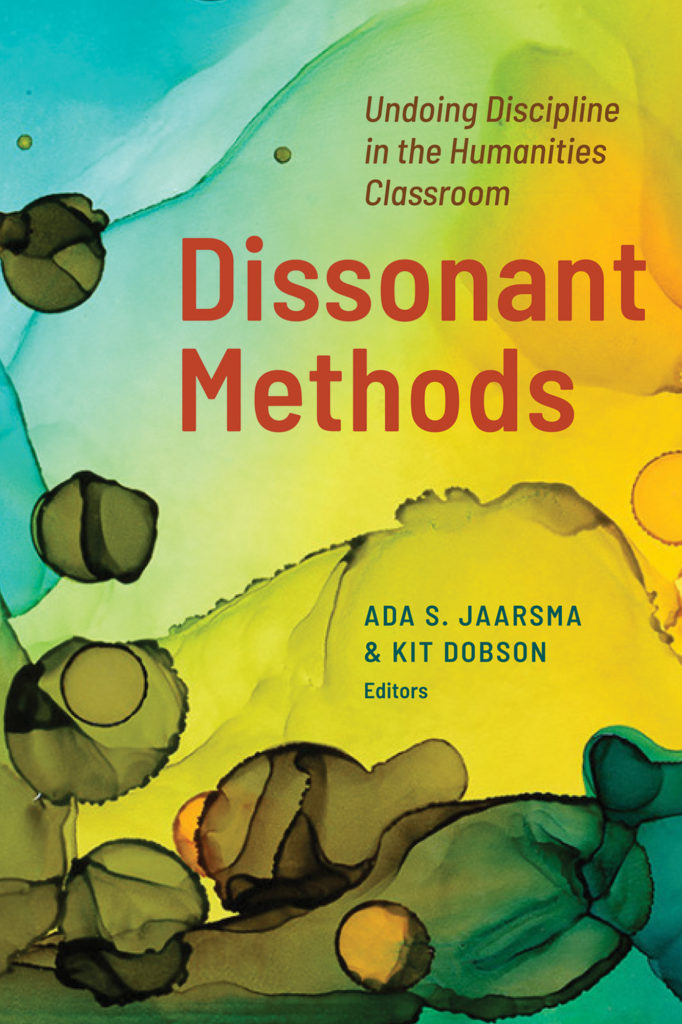
Dissonant Methods: Undoing Discipline in the Humanities Classroom (Edmonton: University of Alberta Press, 2020)
From the publisher’s website:
Dissonant Methods is an innovative collection that probes how, by approaching teaching creatively, postsecondary instructors can resist the constrictions of neoliberalism. Based on the foundations of Scholarship of Teaching and Learning, whereby educators are asked to explore teaching as scholarship, these essays offer concrete and practical meditations on resistant and sustainable teaching. The contributors seek to undermine forms of oppression frequently found in higher education, and instead advance a vision of the university that upholds ideals such as critical thinking, creativity, and inclusivity. Essential reading for faculty and graduate students in the humanities, Dissonant Methods offers urgent, galvanizing ideas for anyone currently teaching in a college or university.
Contributors: Kathy Cawsey, Kit Dobson, Ada S. Jaarsma, Rachel Jones, Kyle Kinaschuk, Namrata Mitra, Guy Obrecht, Katja K. Pettinen, Kaitlin Rothberger, Ely Shipley, Martin Shuster.
“This is an important book, both for those of us who love and teach humanities and for those skeptical about the value of the humanities.”
— MARJEAN D. PURINTON, Professor, Texas Tech University
“Corporatization poses a serious threat to the academic and scholarly integrity of our universities. The authors promote a dialogue about the problem and how it should be addressed.”
— JOSEPH KEEPING, Associate Professor, York University
More information from the University of Alberta Press here.
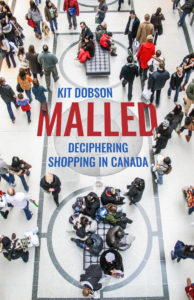
Malled: Deciphering Shopping in Canada
(Hamilton: Wolsak & Wynn, 2017)
From the publisher’s website:
Generally Kit Dobson hates malls. But he is fascinated by them, by their place in our society, by how we interact with them and how they end up in our books, movies and art. In Malled, the author explores malls and the shopping that occurs in and around them from one end of Canada to the other. From Chinook Centre in Calgary to the underground malls of Montreal and even up to the famous Walmart in Whitehorse, he looks at our culture of consumerism, and how malls are both shaped by their location and shape the spaces around them. While Kit may never become fond of aspects of consumer culture like the selfie stick or the Elf on the Shelf, by the end of Malled, he has found a peace with our spaces for shopping, which he suggests are only a more recent reflection of a need that will never go away.
“Malled is many wonderful things. A thoughtful meditation on the place of shopping in Canadian life, it is also deeply political, but free of the easy moralizing that marks so much writing about consumption and the shopping mall. As he moves from city to city, and mall to mall, Dobson reflects in honest and inventive ways about his complex relationship to shopping and the places in which it happens. The book is a refreshing, engaging, highly readable account of encounters with shopping malls, cities, people, books and movies.”
— WILL STRAW, author of Cyanide and Sin: Visualizing Crime in 50s America
“Malled does much more than decipher shopping: it asks tough questions about the beautiful and frustrating pastiche of our culture, the way our buying practices combine the absurd and the incomprehensible and how we have been taken hostage by disposable acquisition. Kit Dobson’s gentle and generous look at the mad folly of our being human together, in the mall, shopping for stuff we don’t need is queasy, fascinating and poetic, a wonderful amalgam of desire and degradation.”
— ARITHA VAN HERK, author of Mavericks: An Incorrigible History of Alberta
More information from Wolsak & Wynn here.
Please, No More Poetry: The Poetry of derek beaulieu
(Waterloo: Wilfrid Laurier University Press, 2013)
From the publisher’s website:
Since the beginning of his poetic career in the 1990s, derek beaulieu has created works that have challenged readers to understand in new ways the possibilities of poetry. With nine books currently to his credit, and many works appearing in chapbooks, broadsides, and magazines, beaulieu continues to push experimental poetry, both in Canada and internationally, in new directions. Please, No More Poetry is the first selected works of derek beaulieu.
As the publisher of first housepress and, more recently, No Press, beaulieu has continually highlighted the possibilities for experimental work in a variety of writing communities. His own work can be classified as visual poetry, as concrete poetry, as conceptual work, and beyond. His work is not to be read in any traditional sense, as it challenges the very idea of reading; rather, it may be understood as a practice that forces readers to reconsider what they think they know. As beaulieu continues to push himself in new directions, readers will appreciate the work that he has created to date, much of which has become unavailable in Canada.
With an introduction by Kit Dobson and an interview with derek beaulieu by Lori Emerson as an afterword, Please, No More Poetry offers readers an opportunity to gain access to a complex experimental poetic practice through thirty-five selected representative works.
More information from Wilfrid Laurier University Press here.
Producing Canadian Literature: Authors Speak on the Literary Marketplace
(with Smaro Kamboureli; Waterloo: Wilfrid Laurier UP, 2013)
From the publisher’s website:
Producing Canadian Literature: Authors Speak on the Literary Marketplace brings to light the relationship between writers in Canada and the marketplace within which their work circulates. Through a series of conversations with both established and younger writers from across the country, Kit Dobson and Smaro Kamboureli investigate how writers perceive their relationship to the cultural economy—and what that economy means for their creative processes.
The interviews in Producing Canadian Literature focus, in particular, on how writers interact with the cultural institutions and bodies that surround them. Conversations pursue the impacts of arts funding on writers; show how agents, editors, and publishers affect writers’ works; examine the process of actually selling a book, both in Canada and abroad; and contemplate what literary awards mean to writers. Dialogues with Christian Bök, George Elliott Clarke, Daniel Heath Justice, Larissa Lai, Stephen Henighan, Roy Miki, Erín Moure, Ashok Mathur, Lee Maracle, Jane Urquhart, and Aritha van Herk testify to the broad range of experience that writers in Canada have when it comes to the conditions in which their work is produced.
Original in its desire to directly explore the specific circumstances in which writers work—and how those conditions affect their writing itself—Producing Canadian Literature will be of interest to scholars, students, aspiring writers, and readers who have followed these authors and want to know more about how their books come into being.
More information from Wilfrid Laurier University Press here.
Transnationalism, Activism, Art
(edited with Áine McGlynn; Toronto: University of Toronto Press, 2013)
From the publisher’s website:
Banksy is known worldwide for his politically subversive works of art, but he is far from the only artist whose creations are infused with internationally relevant, activist themes. How else can the arts help activate citizen participation in social justice movements? Moreover, what is the role of culture in a globalizing world?
Transnationalism, Activism, Art goes beyond Banksy by investigating how the three complementary political, social, and cultural phenomena listed in the title interact in the twenty-first century. Renowned and emerging critics use current theory on cultural production and politics to illuminate case studies of various media, including film, literature, visual art, and performance, in their multiple manifestations, from electronic dance music to Wikileaks to bestselling poetry collections. By addressing how these artistic media are used to enact citizen participation in social justice movements, the volume makes important connections between such participation and scholarly study of globalization and transnationalism.
More information from the University of Toronto Press here.
Transnational Canadas: Anglo-Canadian Literature and Globalization
(Waterloo: Wilfrid Laurier University Press, 2009)
From the publisher’s website:
Transnational Canadas marks the first sustained inquiry into the relationship between globalization and Canadian literature written in English. Tracking developments in the literature and its study from the centennial period to the present, it shows how current work in transnational studies can provide new insights for researchers and students.
Arguing first that the dichotomy of Canadian nationalism and globalization is no longer valid in today’s economic climate, Transnational Canadas explores the legacy of leftist nationalism in Canadian literature. It examines the interventions of multicultural writing in the 1980s and 1990s, investigating the cultural politics of the period and how they increasingly became part of Canada’s state structure. Under globalization, the book concludes, we need to understand new forms of subjectivity and mobility as sites for cultural politics and look beyond received notions of belonging and being.
An original contribution to the study of Canadian literature, Transnational Canadas seeks to invigorate discussion by challenging students and researchers to understand the national and the global simultaneously, to look at the politics of identity beyond the rubric of multiculturalism, and to rethink the slippery notion of the political for the contemporary era.
More information from Wilfrid Laurier University Press here.

